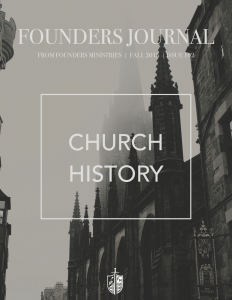Historical theology has been defined as “the study of the interpretation of Scripture and the formulation of doctrine by the church of the past.”1 Simply put, historical theology is answering this question: How has the church thought about the Bible in the past? Some people hear the words “historical theology” and think that there couldn’t be a more boring and useless endeavor. However, I’d like to list for you 7 rapid-fire reasons why the study of historical theology is immensely practical.2
- Studying historical theology sharpens our minds.
Studying what the church has thought pushes us to rigorously engage our own thoughts on any given doctrine. For example, historical theology gives us the tools we need to distinguish Trinitarian orthodoxy from heresy. How should we think about persons and natures within the doctrine of God and Christology? Knowing how the church has wrestled with these issues gives us a huge advantage.
- Studying historical theology produces humility.
It is hard to read Augustine and Gregory of Nazianzus on the Trinity, Anselm on the existence of God, or John Owen on justification and think that you are really a theologian of note.
- Studying historical theology challenges our piety.
Reading about the piety of past Christian brothers and sisters or reading the devotional literature of past saints gives us a glimpse into true Christ-like devotion. Hearing about the mercy ministry in the early church or about the heart-level devotion of the Puritans challenges us to grow in our own spirituality.
- Studying historical theology gives to us a corporate identity.
In an age where excessive individualism is the air that we breathe, studying the thought of past helps shield us from the “penchant for the novel, the yearning for relevancy, and the tendency to follow strong leaders who are biblically and theologically shallow.”3 Furthermore, we can feel a strong connection with those gone past—a historical rootedness—that is so lacking and yet so desired by many people today. One historian wrote beautifully regarding historical theology:
It [historical theology] attaches us to former generations, and inspires us with satisfaction and joy to find, that in the substance of evangelical faith and sentiment we are one with the Church of all ages. To feel this is a prelibation of heaven, where our present-time relations will cease, ancestry and posterity will become cotemporaneous, the faith of one will confirm the faith of another, and the joy of all will be the joy of each.4
- Studying historical theology helps us understand how to handle persecution.
Reading about Ignatius of Antioch, John Wycliffe, John Hus, Ridley and Latimer, or the persecution of early Baptists and Anabaptists gives us examples of courage that are all too rare these days. Knowing how to react when the culture (or even the church) persecutes us is exceedingly valuable for us today.
- Studying historical theology bolsters our hope.
Seeing God’s hand of providence working in the church throughout the centuries bolsters our hope in Jesus’ promise from Matthew 16:18: “On this rock I will build my church, and the gates of hell will not prevail against it.” God has remained faithful to His promise.
- Studying historical theology enhances our worship.
History is a good arbiter of quality. Those hymns and prayers that have survived the passage of time are usually worth examination and implementation. For example, Charles Wesley’s and Fanny Crobsy’s lyrical gifts to the church can greatly enhance our praise of God. We would be foolish to consider only recent compositions.
1 Gregg R. Allison, Historical Theology: An Introduction to Christian Doctrine (Grand Rapids, MI: Zondervan, 2011), 23. See also, Pelikan, Development of Christian Doctrine: Some Historical Prolegomena (New Haven, CT: Yale Press, 1969), 143; Bray, God Has Spoken (Wheaton, IL: Crossway, 2014), 13.
2 See Jeff Robinson’s article on “8 Reasons to Study Baptist Theology.” While I whole-heartedly agree, this post will focus on a broader, more ecumenical appeal to the study of historical theology in general.
3 Ibid., 26.
4 John Stouton, An Introduction to Historical Theology (London: Religious Tract Society, n.d.), 9; Allison, Historical Theology, 29.






















